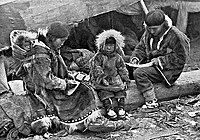
Photo from wikipedia
Objectives Although the use of coping strategies is recognized as playing a vital role in predicting the development of trauma-related symptoms, little research has identified what factors may contribute to… Click to show full abstract
Objectives Although the use of coping strategies is recognized as playing a vital role in predicting the development of trauma-related symptoms, little research has identified what factors may contribute to the utilization, and perceived efficacy of, coping strategies following childhood sexual abuse (CSA). Research has not determined whether aspects of the CSA (e.g., duration, severity) and CSA-related factors such as abuse stressors (e.g., coercion, threats), abuse-related events (e.g., familial disruptions, legal system involvement), and maternal emotional support and blame/doubt correspond with children’s coping use and perceived effectiveness. Methods The current study investigated whether CSA characteristics, abuse stress, and maternal support were related to children’s utilization and perceived efficacy of active/social, internalized, angry, and avoidant coping strategies among 141 sexually abused children aged 7–12 ( M = 9.72, SD = 1.50). Results Children used nearly 7 types of coping strategies ( M = 6.71, SD = 1.63). Longer CSA duration was associated with utilization of internalized and avoidant coping, and maternal blame/doubt predicted the use of avoidant coping. Girls utilized angry coping more frequently than boys. CSA characteristics and abuse stress were largely unrelated to children’s perceived coping efficacy. Minority children reported higher levels of perceived efficacy of internalized strategies than white children. Conclusions CSA duration may be important in understanding children’s utilization of internalized and avoidant coping strategies and maternal blame/doubt may be related to children’s use of avoidant coping. However, CSA characteristics and abuse stress may ultimately have little bearing on sexually abused children’s use and perceived efficacy of coping strategies.
Journal Title: Journal of Child and Family Studies
Year Published: 2019
Link to full text (if available)
Share on Social Media: Sign Up to like & get
recommendations!